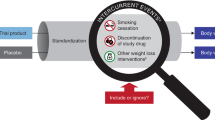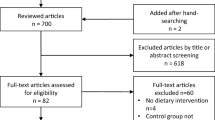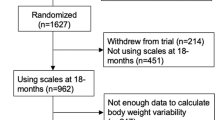Abstract
Although studies in obese subjects using weight loss medications typically report mean and categorical weight loss, results from diet and exercise intervention trials typically only report mean weight change from baseline along with a level of significance. These data alone do not give clinicians or administrators the data needed to determine the probability that an individual will achieve clinically relevant weight loss. Thus, it is difficult to decide which patients, employees or health plan enrollee would benefit from the type and level of support used in a clinical trial. Our goal was to assess what fraction of subjects enrolled in lifestyle modification interventions achieved clinically significant weight loss. Thus, we requested categorical weight loss data from several investigators who had published results from studies involving either a high- or low-intensity lifestyle modification intervention arm. These categorical data indicate that a substantial fraction of subjects in each lifestyle modification intervention achieved clinically meaningful weight loss, even when the average weight loss is modest.
This is a preview of subscription content, access via your institution
Access options
Subscribe to this journal
Receive 12 print issues and online access
$259.00 per year
only $21.58 per issue
Buy this article
- Purchase on Springer Link
- Instant access to full article PDF
Prices may be subject to local taxes which are calculated during checkout
Similar content being viewed by others
References
The US Department of Health and Human Services, Centers for Disease Control and Prevention. Obesity and Overweight. http://www.cdc.gov/nccdphp/dnpa/obesity/index.htm. (last updated 7 January 2009, Last accessed 9 January 2009).
The Look AHEAD Research Group. The Look AHEAD study: a description of the lifestyle intervention and the evidence supporting it. Obesity 2006; 14: 737–752.
Franz MJ, Van Wormer JJ, Crain AL, Boucher JL, Histon T, Caplan W et al. Weight-loss outcomes: a systematic review and meta-analysis of weight-loss clinical trials with a minimum of 1-year follow-up. J Am Diet Assoc 2007; 107: 1755–1767.
Dansinger ML, Tatsioni A, Wong JB, Chung M, Balk EM . Meta-analysis: the effect of dietary counseling for weight loss. Ann Intern Med 2007; 147: 41–50.
Tsai AG, Wadden TA . Systematic review: an evaluation of major commercial weight loss programs in the United States. Ann Intern Med 2005; 142: 56–66.
Rucker D, Padwal R, Li SK, Curioni C, Lau DC . Long-term pharmacotherapy for obesity and overweight: updated meta-analysis. Br Med J 2007; 335: 1194–1199.
Douketis JD, Macie C, Thabane L, Williamson DF . Systematic review of long-term weight loss studies in obese adults: clinical significance and applicability to clinical practice. Int J Obes 2005; 29: 1153–1167.
Crémieux PY, Ghosh A, Yang HE, Buessing M, Buchwald H, Shikora SA . Return on investment for bariatric surgery. Am J Manag Care 2008; 14: e5–e6.
The Disease Management Association of America. Obesity Toolkit. DMAA: Washington DC, 2008.
National Institutes of Health. National Heart, Lung and Blood Institute. Clinical guidelines on the identification, evaluation and treatment of overweight and obesity in adults. The evidence report. Obes Res 1998; 6 (Suppl 2): 51S–209S.
US Department of Health and Human Services Food and Drug Administration Center for Drug Evaluation and Research. (2007). Guidance for Industry: Developing Products for Weight Management http://www.fda.gov/downloads/Drugs/GuidanceComplianceRegulatoryInformation/Guidances/ucm071612.pdf (last accessed 14 August 2007).
Klein S, Burke LE, Bray GA, Blair S, Allison DB, Pi-Sunyer X et al., American Heart Association Council on Nutrition, Physical Activity, and Metabolism. Clinical implications of obesity with specific focus on cardiovascular disease: a statement for professionals from the American Heart Association Council on Nutrition, Physical Activity, and Metabolism: endorsed by the American College of Cardiology Foundation. Circulation 2004; 110: 2952–2967.
Cummings DE, Flum DR . Gastrointestinal surgery as a treatment for diabetes. JAMA 2008; 299: 341–343.
Diabetes Prevention Program Research Group. Effect of weight loss with lifestyle intervention on risk of diabetes. Diabetes Care 2006; 29: 2102–2107.
NHLBI Obesity Education Initiative Expert Panel on the Identification, Evaluation, and Treatment of Overweight and Obesity in Adults. The practical guide identification, evaluation, and treatment of overweight and obesity in adults. http://www.nhlbi.nih.gov/guidelines/obesity/prctgd_c.pdf (last accessed 25 June 2009).
Rissanen A, Lean M, Rössner S, Segal KR, Sjöström L . Predictive value of early weight loss in obesity management with orlistat: an evidence-based assessment of prescribing guidelines. Int J Obes 2003; 27: 103–109.
Acknowledgements
Dr Bessesen receives support from NIH DK02935, the other authors received no support.
Author information
Authors and Affiliations
Corresponding author
Rights and permissions
About this article
Cite this article
Christian, J., Tsai, A. & Bessesen, D. Interpreting weight losses from lifestyle modification trials: using categorical data. Int J Obes 34, 207–209 (2010). https://doi.org/10.1038/ijo.2009.213
Received:
Revised:
Accepted:
Published:
Issue Date:
DOI: https://doi.org/10.1038/ijo.2009.213
Keywords
This article is cited by
-
A systematic review and meta-analysis of weight loss in control group participants of lifestyle randomized trials
Scientific Reports (2022)
-
Personalized cognitive-behavioural therapy for obesity (CBT-OB): theory, strategies and procedures
BioPsychoSocial Medicine (2020)
-
Personalized group cognitive behavioural therapy for obesity: a longitudinal study in a real-world clinical setting
Eating and Weight Disorders - Studies on Anorexia, Bulimia and Obesity (2020)
-
The relationship of weight suppression to treatment outcomes during behavioral weight loss
Journal of Behavioral Medicine (2019)
-
Participant and interventionist perceptions of challenges during behavioral weight loss treatment
Journal of Behavioral Medicine (2019)



